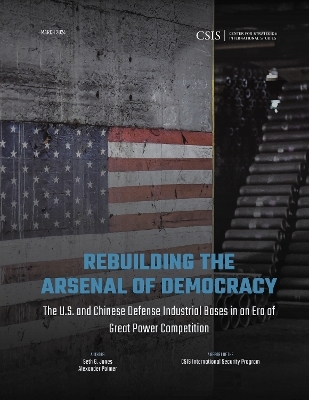
Rebuilding the Arsenal of Democracy: The U.S. and Chinese Defense Industrial Bases in an Era of Great Power Competition
Seiten
2024
Rowman & Littlefield Publishers (Verlag)
978-1-5381-7076-2 (ISBN)
Rowman & Littlefield Publishers (Verlag)
978-1-5381-7076-2 (ISBN)
China's defense industrial base is moving to a wartime footing, while the United States is largely in a peacetime stance. Absent urgent changes, the United States risks weakening deterrence and undermining its warfighting capabilities against China and other competitors.
China's defense industrial base is operating on a wartime footing, while the U.S. defense industrial base is largely operating on a peacetime footing. Overall, the U.S. defense industrial ecosystem lacks the capacity, responsiveness, flexibility, and surge capability to meet the U.S. military's production and warfighting needs. Unless there are urgent changes, the United States risks weakening deterrence and undermining its wartime capabilities. China is heavily investing in munitions and acquiring high-end weapons systems and equipment five to six times faster than the United States. China is also the world's largest shipbuilder and has a shipbuilding capacity that is roughly 230 times larger than the United States. One of China's large shipyards, such as Jiangnan Shipyard, has more capacity than all U.S. shipyards combined.
China's defense industrial base is operating on a wartime footing, while the U.S. defense industrial base is largely operating on a peacetime footing. Overall, the U.S. defense industrial ecosystem lacks the capacity, responsiveness, flexibility, and surge capability to meet the U.S. military's production and warfighting needs. Unless there are urgent changes, the United States risks weakening deterrence and undermining its wartime capabilities. China is heavily investing in munitions and acquiring high-end weapons systems and equipment five to six times faster than the United States. China is also the world's largest shipbuilder and has a shipbuilding capacity that is roughly 230 times larger than the United States. One of China's large shipyards, such as Jiangnan Shipyard, has more capacity than all U.S. shipyards combined.
Seth G. Jones is senior vice president, Harold Brown Chair, director of the International Security Program, and director of the Transnational Threats Project at the Center for Strategic and International Studies (CSIS). Alexander Palmer is an associate fellow with the Transnational Threats Project at CSIS.
| Erscheinungsdatum | 03.05.2024 |
|---|---|
| Verlagsort | Lanham, MD |
| Sprache | englisch |
| Maße | 216 x 278 mm |
| Gewicht | 231 g |
| Themenwelt | Sozialwissenschaften ► Politik / Verwaltung ► Europäische / Internationale Politik |
| Sozialwissenschaften ► Politik / Verwaltung ► Staat / Verwaltung | |
| ISBN-10 | 1-5381-7076-0 / 1538170760 |
| ISBN-13 | 978-1-5381-7076-2 / 9781538170762 |
| Zustand | Neuware |
| Haben Sie eine Frage zum Produkt? |
Mehr entdecken
aus dem Bereich
aus dem Bereich
Studienbuch
Buch | Hardcover (2023)
De Gruyter Oldenbourg (Verlag)
44,95 €
erfolgreiche Interessenvertretung durch Prozesskompetenz im komplexen …
Buch | Hardcover (2023)
Wiley-VCH (Verlag)
42,00 €


